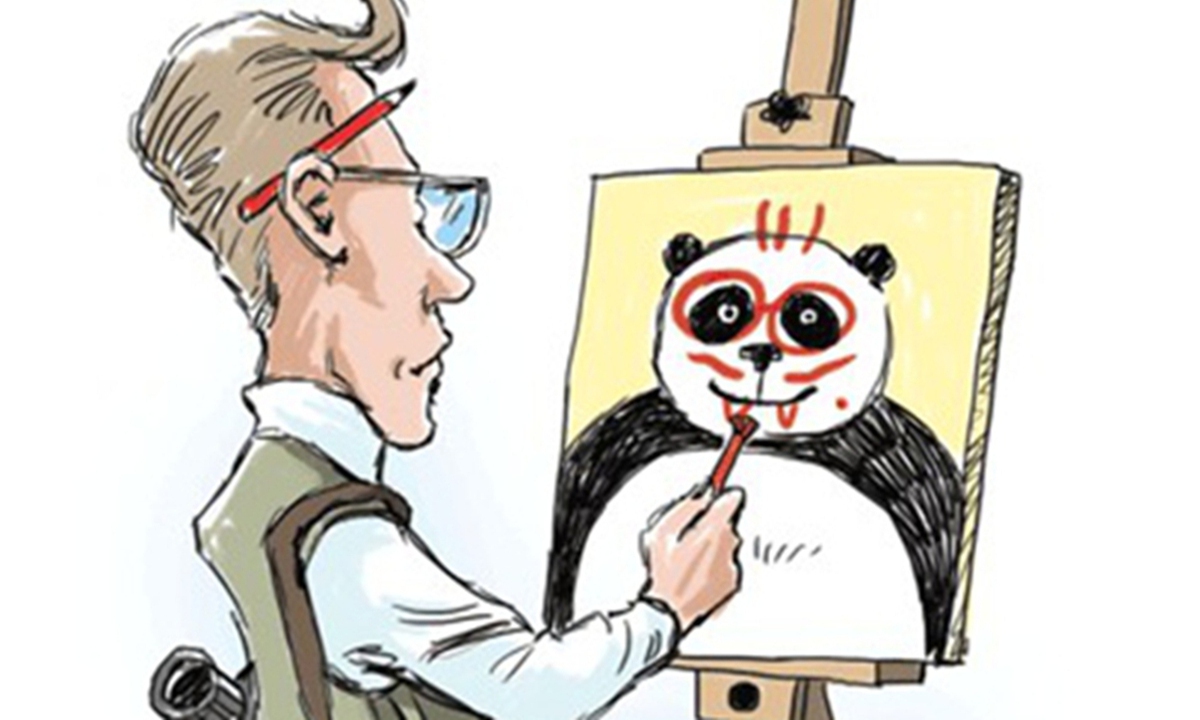
Illustration: Liu Rui/GT
In today's Ukraine, it is easy to stir up people's nerves against another country, if the Ukrainians are made to believe that some vulgar comments, if any, from individuals of the country represent the view of the entire country.
On China's internet domain, some people are talking about a wave of anti-Chinese sentiment emerging in Ukraine that may endanger the safety of Chinese nationals living in the country. The reason is that a handful of Chinese netizens - male ones, to be exact - said on China's social media platforms they wanted to take home Ukrainian beauties who have lost their homes amid the ongoing Ukraine crisis.
If one reads through China's social media, he would know that the mainstream Chinese people hold a generally friendly attitude toward Ukraine and they hope peace could be restored in the country as soon as possible. The Chinese government has adopted a reasonable and balanced approach to the Ukraine crisis, and this represents the attitude of the Chinese people as well.
Western social media platforms such as Twitter are filled with disrespectful views toward Ukraine, and there are also insulting jokes against Ukraine women. How come that only the "anti-Chinese sentiment" was exacerbated?
A Twitter user, who is suspected of coming from Taiwan but uses simplified Chinese characters instead of the traditional characters used on the island , maliciously tweeted unverified messages which seemed to be from the Chinese mainland that mocked Ukrainian women. Then SupChina, a US-based digital media company covering China, picked up the hook and labeled these messages as "the absolutely worst opinion one could make about the deadly situation."
The tactic of fanning the "anti-Chinese" flame in Ukraine as well as in the West from self-claimed "independent" media outlet coordinates with the West's long-held interest in winning a war against China without firing a shot. To this end, the West and its media outlets are expanding potential areas of conflict from the purely military one to the political and social ones, mostly by manipulating public opinion. In the wake of the Ukraine crisis, the West aims to twist China's official stance and public opinion so it can impair China's interests and create a favorable opinion atmosphere for itself.
Public opinion warfare is always part of the warfare itself. Shen Yi, a professor at the School of International Relations and Public Affairs of Fudan University, told the Global Times that in the ongoing Ukraine crisis, the Western media have taken on the task of becoming the tool of Western countries' opinion warfare and closely coordinated the policy of Western countries to speak up for them.
"The essence of the opinion warfare is to disturb the opponent's battlefield while safeguarding one's own," said Shen.
Some people believe the anti-Chinese sentiments of the Ukrainians are a result of a large majority of Chinese netizens' support for Russia as well as the jokes a handful of them made about Ukrainian girls. Such views miss the point. The main reason is that many Ukrainians hope China and the Chinese people would have adopted the same attitude toward the war as the US and the West did. As a result, any public opinion from China, when manipulated by Western forces, can easily ignite the nerves of the Ukrainian people.
As more and more Ukrainians realize that the US and the West can hardly be reliable partners, they would understand the position of China which promotes a political settlement for the issue rather than creating and shifting the crisis and trying to benefit from it. China believes that the Ukraine issue has a complicated history and that the legitimate security concerns of all parties should be respected.
Chinese netizens should be mindful of their comments during the Ukraine crisis, but what some said should not become an excuse by Western forces to fan anti-Chinese flame and seek geopolitical gains at the cost of safety and interests of the Chinese people abroad.




